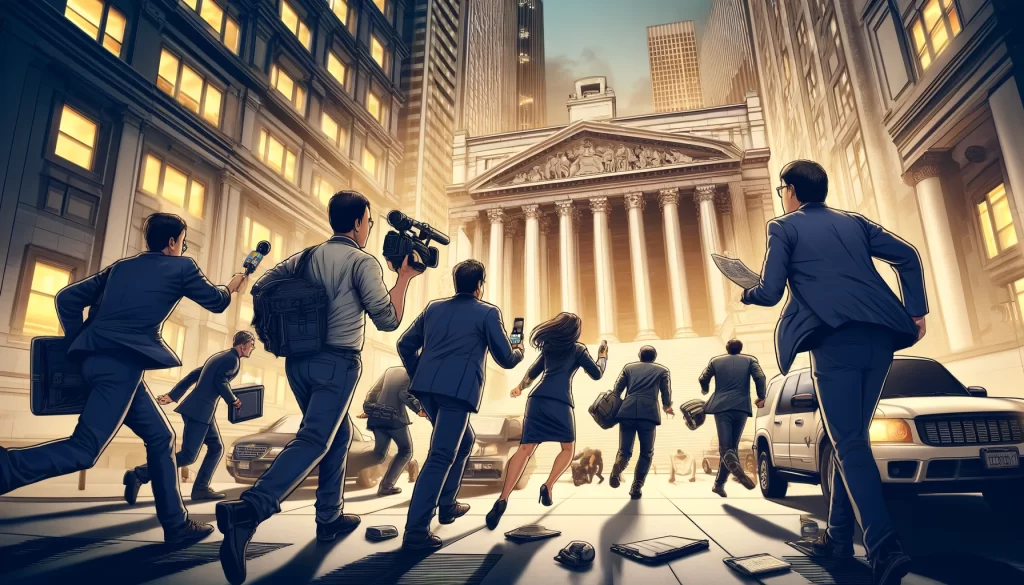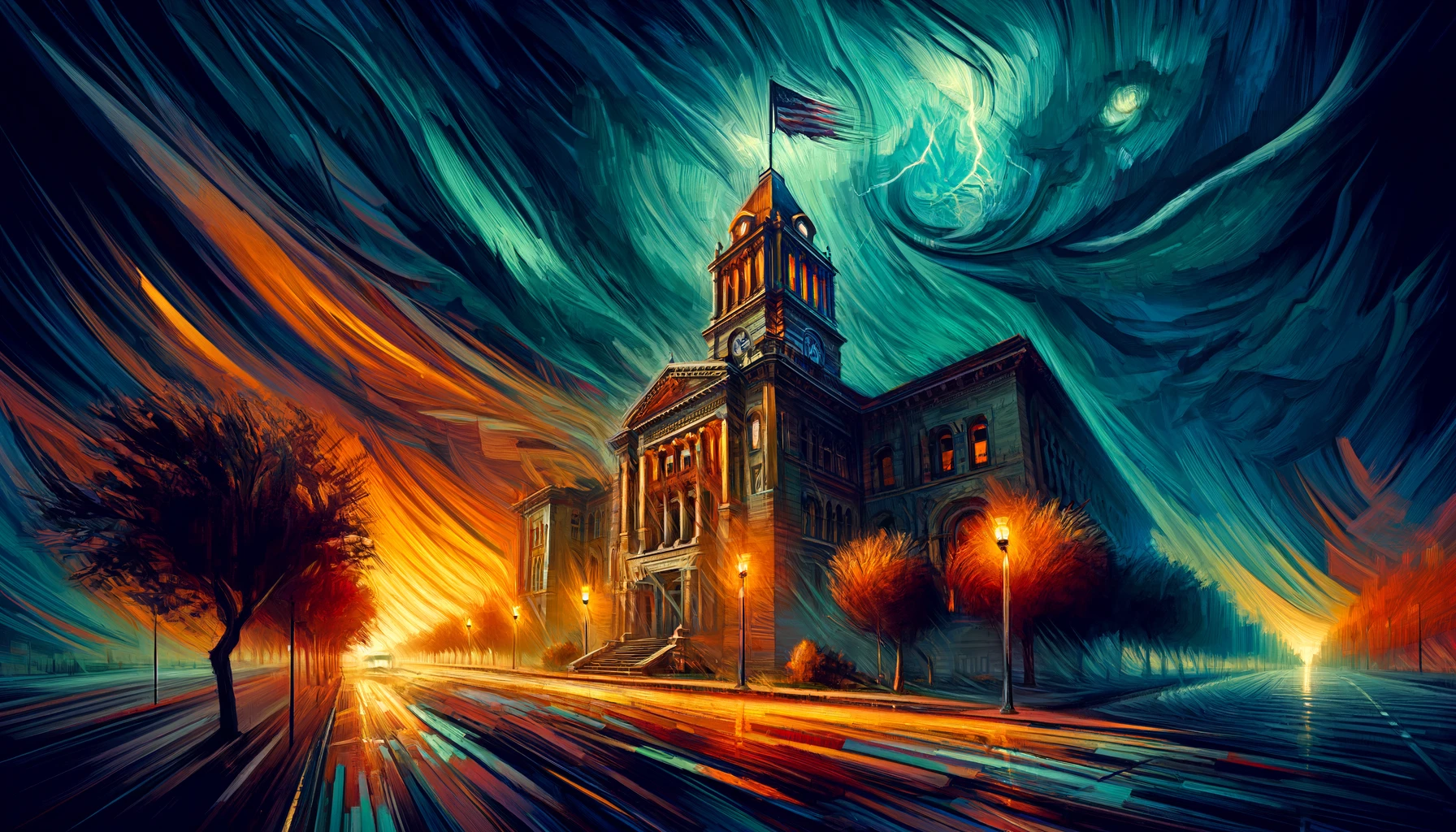The first week of the criminal trial of former President Donald J. Trump concluded with a shocking incident: a man set himself on fire outside the courthouse, temporarily shifting the focus from the legal discussions within the building.
The unsettling event occurred right after the final jurors were selected for the trial. The jury, consisting of 12 seated jurors and six alternates, was sworn in amid the chaos. News of the self-immolation quickly spread among the reporters gathered at the courthouse in Lower Manhattan, leading many to leave the courtroom to find out more.
Despite the distraction, the trial proceedings, which have been moving quickly, continued without delay. After a short break for lunch, Justice Juan M. Merchan held a hearing to decide on the permissible questions for the prosecution should Trump choose to testify in his own defense.
Donald J. Trump, aged 77, faces allegations of falsifying 34 business records to conceal a payment to Stormy Daniels, an adult film actress who claims they had a sexual encounter in 2006. The prosecution argues that this was done to enhance his chances in the election. Trump has denied these accusations and could face probation or prison if found guilty.
Opening statements for the trial are scheduled for Monday.

Here are some key points from the first week of the trial:
1. Jury Selection Complete: The selection process was intense but resulted in a jury composed of 12 residents from Manhattan, with six alternates ready to step in if necessary. The group includes individuals from various professions and neighborhoods, reflecting the diversity of the city. Notably, the Upper East Side is the most represented area among the jurors and alternates.
2. No More Delays for Trump: Trump’s legal team has often employed stalling tactics, but these efforts appear to be waning as the trial progresses. An attempt to delay the opening statements through an appeals court was unsuccessful, and Justice Merchan has made it clear that the trial will proceed as planned.
3. Potential Challenges for Trump on the Stand: Although Trump has expressed a desire to testify, doing so would allow the prosecution to question him about other legal setbacks, including a civil fraud trial where he was found to have inflated his net worth, and a verdict finding him liable for sexually abusing writer E. Jean Carroll. The defense argues that discussing these matters could lead the trial astray and confuse the jurors.
4. Distraction Outside the Courtroom: The trial was briefly overshadowed by a tragic incident when Max Azzarello, aged 37 from St. Augustine, Florida, set himself on fire in a nearby park. This act of self-immolation, which involved throwing anti-government leaflets into the air, drew immediate media attention away from the trial. Sadly, Mr. Azzarello passed away from his injuries that evening.
5. Dramatic First Week: The trial has already seen its share of drama, from a heavy media presence to emotional reactions from potential jurors. Many expressed concerns about their ability to remain impartial, leading to intense debates and challenges during jury selection.
The trial promises more intense moments in the coming weeks, potentially featuring testimonies from key figures such as Michael Cohen, Trump’s former lawyer, and possibly Stormy Daniels and Karen McDougal, both of whom have claimed affairs with Trump, which he denies. Other notable figures, like Hope Hicks, may also appear as witnesses.
This article is based on the following article:

Background Information
This background will help readers understand the complexities of the trial, the legal and political significance, and why it garners so much media attention and public interest.
1. Who is Donald J. Trump?
Donald J. Trump is a prominent business figure and television personality who served as the 45th President of the United States from January 2017 to January 2021. Prior to his presidency, he was well-known for his real estate ventures and as the host of the reality TV show, “The Apprentice.”
2. The Legal System and Criminal Trials
In the United States, the criminal justice system handles cases where someone is accused of breaking the law. The system includes multiple steps:
- Arrest and Charges: The process starts when the police arrest someone and the prosecutor files charges.
- Trial: The accused person (defendant) goes to trial where a jury of peers listens to the evidence presented by both the defense and the prosecution.
- Verdict and Sentencing: The jury decides if the defendant is guilty or not. If guilty, the judge determines the sentence.
3. Jury Selection
Jury selection is a critical phase in a trial where lawyers from both sides select members of the public to form a jury. The goal is to ensure the jury is impartial and representative of the community. Potential jurors are questioned in a process called voir dire to identify any biases.
4. Charges Against Trump
Donald J. Trump, the former President of the United States, faces legal challenges that include charges of falsifying business records. These charges are particularly connected to a payment made to Stormy Daniels, an adult film actress. Here’s a detailed breakdown of the situation:
- Who is Stormy Daniels?
Stormy Daniels, whose real name is Stephanie Clifford, is an adult film actress and director. She came into the national spotlight not just for her career but for her alleged involvement with Donald Trump.
- Alleged Affair
The controversy centers around an alleged affair between Stormy Daniels and Donald Trump that Daniels claims occurred in 2006. This was after Trump had married his third wife, Melania Trump, but before his political career had escalated to a presidential run.
- The Payment
In the lead-up to the 2016 Presidential election, as Trump was securing his position as the Republican nominee, a payment of $130,000 was made to Daniels. This payment is alleged to have been made to prevent her from discussing the affair publicly, which could have potentially damaged Trump’s election prospects.
- Legal Implications of the Payment
The payment to Daniels is at the core of the charges against Trump. Prosecutors argue that Trump’s organization falsified business records related to this payment. Essentially, they claim that the records were altered or fabricated to disguise the true nature of the expense, which was effectively hush money intended to influence the election outcome by suppressing damaging information.
- Falsifying Business Records
Falsifying business records becomes a criminal offense when it’s done with the intent to commit or conceal another crime. In this case, the other crime would be a violation of campaign finance laws, which require transparency and limits on contributions and expenditures related to election campaigns.
- Why This Matters
The case against Trump is significant because it touches on the integrity of the electoral process and the legality of actions taken to influence it. If the payment was indeed intended as hush money and was not reported as a campaign expense, it could represent an illegal attempt to influence the election through nondisclosure of pivotal information.
5. Stormy Daniels and Karen McDougal
Stormy Daniels and Karen McDougal are women who have publicly claimed they had affairs with Donald Trump, which he denies. These allegations became widely publicized and politically significant as they were said to have occurred close to Trump’s campaign and presidency.
6. Legal Terms and Concepts
- Falsifying Business Records: This charge involves altering, concealing, falsifying, or destroying business records with the intent to deceive or defraud.
- Civil vs. Criminal Cases: It’s important to distinguish between civil and criminal cases. Civil cases deal with disputes between individuals or organizations, often involving compensation. Criminal cases deal with actions considered harmful to society; the government prosecutes the defendant.
7. Political and Public Impact
Trials involving former presidents are rare and carry significant political and public interest due to their past role and influence. Such trials are closely watched and can be divisive.
8. The Role of Media
The media plays a crucial role in how public trials are perceived by reporting on the developments and providing analysis. In high-profile cases like Trump’s, media coverage is intense and can influence public opinion.
9. Implications of a President Being Tried
The trial of a former president is a significant event because it tests the legal and democratic systems’ ability to hold high-ranking officials accountable. It also raises questions about fairness, justice, and political motivations.

Debate/Essay Questions
- Are non-disclosure agreements ethical in situations involving potential crimes or political figures, or do they serve as a necessary tool for privacy and protection?
- Is it ethical for public figures to use non-disclosure agreements to prevent disclosure of personal information?
Please subscribe to Insight Fortnight, our biweekly newsletter!
